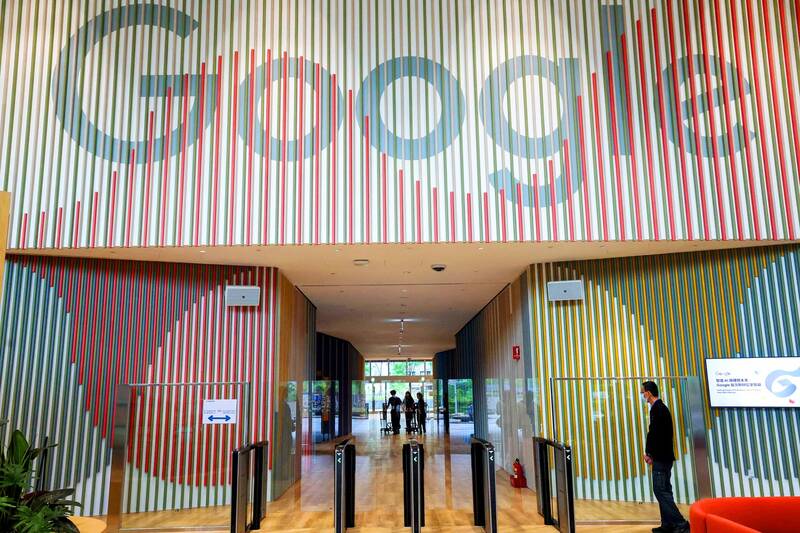President Tsai Ing-wen (蔡英文) yesterday attended an event marking the opening of Google’s second hardware research and development (R&D) office in Taiwan, which was held at New Taipei City’s Banciao District (板橋).
This signals Taiwan’s transformation into the world’s largest Google hardware research and development center outside of the US, validating the nation’s economic policy in the past eight years, she said.
The “five plus two” innovative industries policy, “six core strategic industries” initiative and infrastructure projects have grown the national industry and established resilient supply chains that withstood the COVID-19 pandemic, Tsai said.

Photo: CNA
Taiwan has improved investment conditions of the domestic economy and strengthened its pull on major global investors, with the volume of foreign investment rising to US$11.25 billion last year, she said, adding that the average annual foreign investment volume in Taiwan was US$10.3 billion between 2016 and last year, up from US$5.36 billion between 2008 and 2015.
The surge in foreign investment shows that the nation has further cemented its position in global supply chains and raised its profile on the world stage, Tsai said.
The president thanked Google for contributing to the government’s “Smart Taiwan” initiative, including efforts to upgrade the information technology sector, increase the application of smart technology in industries and scale up Taiwan’s digital economy.
Google has demonstrated corporate social responsibility by providing educational resources to rural schools and joining the National Institute of Cyber Security in the fight against fake news and cyberattacks, Tsai said.
It has been 11 years since Google established its first regional-level data center in the nation and it is currently building four undersea cables to connect Taiwan to the world, Premier Chen Chien-jen (陳建仁) said.
This is to establish Taiwan as a key nexus through which global digital data would flow, bolstering the nation’s competitiveness and importance to the international community, he said.
Google opened its first Taiwan office in 2006 and has presided over the continuous growth of its Taiwanese team since then, Google vice president of hardware Elmer Peng (彭昱鈞) said.
The tech giant’s team in Taiwan, which is 20 times larger than its size 10 years ago, now recruits workers from more than 30 countries and regions around the world, Peng said.

MULTIFACETED: A task force has analyzed possible scenarios and created responses to assist domestic industries in dealing with US tariffs, the economics minister said The Executive Yuan is tomorrow to announce countermeasures to US President Donald Trump’s planned reciprocal tariffs, although the details of the plan would not be made public until Monday next week, Minister of Economic Affairs J.W. Kuo (郭智輝) said yesterday. The Cabinet established an economic and trade task force in November last year to deal with US trade and tariff related issues, Kuo told reporters outside the legislature in Taipei. The task force has been analyzing and evaluating all kinds of scenarios to identify suitable responses and determine how best to assist domestic industries in managing the effects of Trump’s tariffs, he

TIGHT-LIPPED: UMC said it had no merger plans at the moment, after Nikkei Asia reported that the firm and GlobalFoundries were considering restarting merger talks United Microelectronics Corp (UMC, 聯電), the world’s No. 4 contract chipmaker, yesterday launched a new US$5 billion 12-inch chip factory in Singapore as part of its latest effort to diversify its manufacturing footprint amid growing geopolitical risks. The new factory, adjacent to UMC’s existing Singapore fab in the Pasir Res Wafer Fab Park, is scheduled to enter volume production next year, utilizing mature 22-nanometer and 28-nanometer process technologies, UMC said in a statement. The company plans to invest US$5 billion during the first phase of the new fab, which would have an installed capacity of 30,000 12-inch wafers per month, it said. The

In a small town in Paraguay, a showdown is brewing between traditional producers of yerba mate, a bitter herbal tea popular across South America, and miners of a shinier treasure: gold. A rush for the precious metal is pitting mate growers and indigenous groups against the expanding operations of small-scale miners who, until recently, were their neighbors, not nemeses. “They [the miners] have destroyed everything... The canals, springs, swamps,” said Vidal Britez, president of the Yerba Mate Producers’ Association of the town of Paso Yobai, about 210km east of capital Asuncion. “You can see the pollution from the dead fish.

Taiwan’s official purchasing managers’ index (PMI) last month rose 0.2 percentage points to 54.2, in a second consecutive month of expansion, thanks to front-loading demand intended to avoid potential US tariff hikes, the Chung-Hua Institution for Economic Research (CIER, 中華經濟研究院) said yesterday. While short-term demand appeared robust, uncertainties rose due to US President Donald Trump’s unpredictable trade policy, CIER president Lien Hsien-ming (連賢明) told a news conference in Taipei. Taiwan’s economy this year would be characterized by high-level fluctuations and the volatility would be wilder than most expect, Lien said Demand for electronics, particularly semiconductors, continues to benefit from US technology giants’ effort